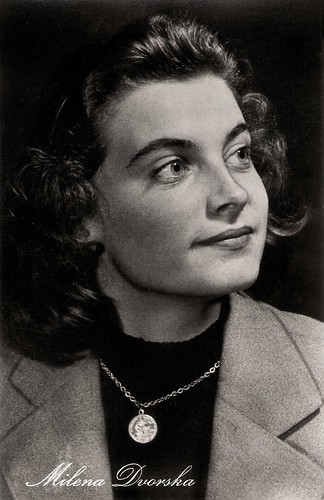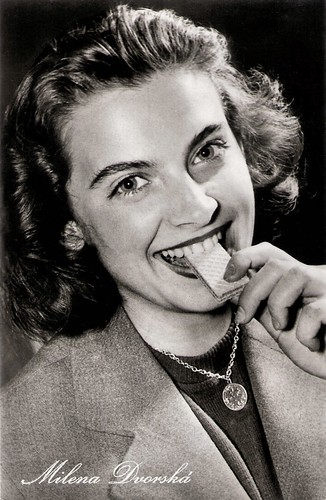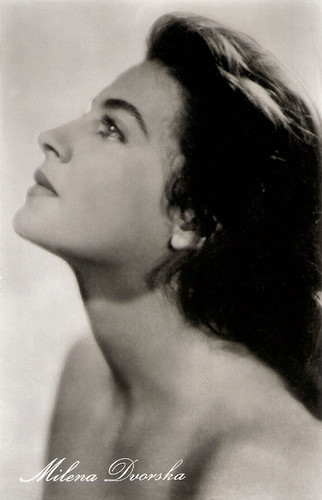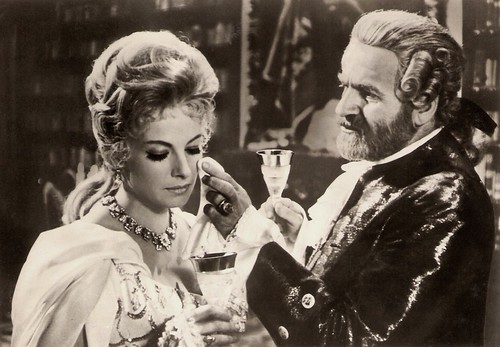Czech actress Milena Dvorská (1938-2009) appeared in 70 films and television shows between 1955 and 2009. Dvorská could be seen in many Czech historical films and in fairy tale films.

East-German postcard by VEB Progress Film-Vertrieb, Berlin, no. 283, 1957. Photo: Gerhard Kindt.

East-German postcard by VEB Progress Film-Vertrieb, Berlin, no. 855, 1958. Photo: Gerhard Pullmann.
Milena Dvorská was born in 1938 in Prostejov, Czechoslovakia (now Czech Republic). As a teenager, she worked as a nurse. She had no drama training, but still, she was discovered for the cinema. Her film debut was as Princess Maruška in the fairy tale Byl jednou jeden kraal/There was once a King (Bořivoj Zeman, 1955). The same year she made Anděl na horách/Angel in the Mountains (Borivoj Zeman, 1955).
After these parts, she had a professional drama training at the DAMU - Divadelní Fakulta Akademie múzických umění (the Theatre Faculty of the Academy of Performing Arts) in Prague.
After graduating in 1961, her adult film career started with films like Poslední růže od Casanovy/The last Roses from Casanova (Václav Krška, 1966) in which she played the young Countess Valerie Valdstejns, and the comedy Nejlepší ženská mého života/The Best Woman in My Life (1968), the final film of director Martin Fric.
She would appear in more than 60 very diverse Czechoslovakian film productions. In 1961, she also became a member of the company of the Prague Theatre D 47, led by Emil František Burian. Till 1991, she appeared there in numerous roles.
Between 1970 and 1972, she played in Prague at the Krejčovým Divadlem za branou, a theatre founded by Otomar Krejča. After she left the theatre in 1991, she worked for a while for the office of President Vaclav Havel.

East-German postcard by VEB Progress Film-Vertrieb, Berlin, no. 1042, 1959.

East-German postcard by VEB Progress Film-Vertrieb, Berlin, no. 2688, 1965. Photo: publicity still for Poslední ruze od Casanovy/Last Rose from Casanova (Václav Krska, 1966) with Felix Le Breux as Casanova.
In addition to her film appearances Milena Dvorská also took roles in television films and television series. She acted in an episode of the well-known Czech television series Pan Tau (Jindrich Polák, 1970). In 1973 Dvorská played in the East-German-Czech coproduction Die Elixiere des Teufels/The Devil’s Elixir (Brigitte Karsten, Ralf Kirsten, 1973), an adaptation of the novel by E. T. A. Hoffmann.
In 1975 she played the role of the queen in the mini-series Des Christoffel von Grimmelshausen abenteuerlicher Simplizissimus/The adventurer Simplicissimus (Fritz Umgelter, 1975) alongside Matthias Habich. Opposite Libuše Šafránková, she played the wicked witch in the fairytale film Malá mořská víla/The Little Mermaid (Karel Kachyňa, 1977), based on the tale by Hans Christian Andersen. Another classic fairy tale film is Jak se budí princezny/How to Awake Sleeping Beauty with a Kiss (Václav Vorlíček, 1977), in which she played the queen and the mother of Marie Horáková.
In the cinema, she had supporting parts in such Czech productions as the drama Běž, ať ti neuteče/Do Be Quick (Stanislav Strnad, 1977), the comedy Jára Cimrman ležící, spící/Jára Cimrman Lying, Sleeping (Ladislav Smoljak, 1983), about the fictional national hero Jára Cimrman, and the drama Noc smaragdového měsíce/The Night of the Emerald Moon (Václav Matějka, 1985).
That year, she was also in the melancholy comedy Vesničko má středisková/My Sweet Little Village (Jiří Menzel, 1985) which was nominated for the Oscar for Best Foreign Language Film. In the Czech Republic and Slovakia, the film retains a cult following. In a film version of the opera 'Libuše' by Czech composer Bedřich Smetana, she embodied impressively the title role.
Among her last films were another adaptation of the Sleeping Beauty fairy tale, Šípková Růženka (Stanislav Párnický, 1990) and the bitter comedic-drama Kamenný most/the Stone Bridge (Tomás Vorel, 1996). She also worked as a voice actor. In 1997 she was nominated for the Czech film award Český lev. In 2006, she published her memoir 'Vyprávění o životě' (Talking about Life). Milena Dvorská died in 2009 in Prague, the capital of the Czech Republic. She was 71. Her husband was Josefa Krause and they had a daughter, Lucii, and a son, Jakuba.

East-German postcard by VEB Progress Film-Vertrieb, Berlin, no. 2689, 1965. Photo: Milena Dvorská in Poslední ruze od Casanovy/Last Rose from Casanova (Václav Krska, 1966).
Scene from Poslední růže od Casanovy/Last Rose from Casanova (1966) with Felix le Breux and Milena Dvorská. Source: geislerrgmail (YouTube). Sorry, no subtitles!
Sources: Jaroslav ‘Krib’ Lopour (CSFD – Czech), Wikipedia (German and English), and IMDb.
This post was last updated on 3 February 2024.

East-German postcard by VEB Progress Film-Vertrieb, Berlin, no. 283, 1957. Photo: Gerhard Kindt.

East-German postcard by VEB Progress Film-Vertrieb, Berlin, no. 855, 1958. Photo: Gerhard Pullmann.
There was once a Princess
Milena Dvorská was born in 1938 in Prostejov, Czechoslovakia (now Czech Republic). As a teenager, she worked as a nurse. She had no drama training, but still, she was discovered for the cinema. Her film debut was as Princess Maruška in the fairy tale Byl jednou jeden kraal/There was once a King (Bořivoj Zeman, 1955). The same year she made Anděl na horách/Angel in the Mountains (Borivoj Zeman, 1955).
After these parts, she had a professional drama training at the DAMU - Divadelní Fakulta Akademie múzických umění (the Theatre Faculty of the Academy of Performing Arts) in Prague.
After graduating in 1961, her adult film career started with films like Poslední růže od Casanovy/The last Roses from Casanova (Václav Krška, 1966) in which she played the young Countess Valerie Valdstejns, and the comedy Nejlepší ženská mého života/The Best Woman in My Life (1968), the final film of director Martin Fric.
She would appear in more than 60 very diverse Czechoslovakian film productions. In 1961, she also became a member of the company of the Prague Theatre D 47, led by Emil František Burian. Till 1991, she appeared there in numerous roles.
Between 1970 and 1972, she played in Prague at the Krejčovým Divadlem za branou, a theatre founded by Otomar Krejča. After she left the theatre in 1991, she worked for a while for the office of President Vaclav Havel.

East-German postcard by VEB Progress Film-Vertrieb, Berlin, no. 1042, 1959.

East-German postcard by VEB Progress Film-Vertrieb, Berlin, no. 2688, 1965. Photo: publicity still for Poslední ruze od Casanovy/Last Rose from Casanova (Václav Krska, 1966) with Felix Le Breux as Casanova.
Cult following
In addition to her film appearances Milena Dvorská also took roles in television films and television series. She acted in an episode of the well-known Czech television series Pan Tau (Jindrich Polák, 1970). In 1973 Dvorská played in the East-German-Czech coproduction Die Elixiere des Teufels/The Devil’s Elixir (Brigitte Karsten, Ralf Kirsten, 1973), an adaptation of the novel by E. T. A. Hoffmann.
In 1975 she played the role of the queen in the mini-series Des Christoffel von Grimmelshausen abenteuerlicher Simplizissimus/The adventurer Simplicissimus (Fritz Umgelter, 1975) alongside Matthias Habich. Opposite Libuše Šafránková, she played the wicked witch in the fairytale film Malá mořská víla/The Little Mermaid (Karel Kachyňa, 1977), based on the tale by Hans Christian Andersen. Another classic fairy tale film is Jak se budí princezny/How to Awake Sleeping Beauty with a Kiss (Václav Vorlíček, 1977), in which she played the queen and the mother of Marie Horáková.
In the cinema, she had supporting parts in such Czech productions as the drama Běž, ať ti neuteče/Do Be Quick (Stanislav Strnad, 1977), the comedy Jára Cimrman ležící, spící/Jára Cimrman Lying, Sleeping (Ladislav Smoljak, 1983), about the fictional national hero Jára Cimrman, and the drama Noc smaragdového měsíce/The Night of the Emerald Moon (Václav Matějka, 1985).
That year, she was also in the melancholy comedy Vesničko má středisková/My Sweet Little Village (Jiří Menzel, 1985) which was nominated for the Oscar for Best Foreign Language Film. In the Czech Republic and Slovakia, the film retains a cult following. In a film version of the opera 'Libuše' by Czech composer Bedřich Smetana, she embodied impressively the title role.
Among her last films were another adaptation of the Sleeping Beauty fairy tale, Šípková Růženka (Stanislav Párnický, 1990) and the bitter comedic-drama Kamenný most/the Stone Bridge (Tomás Vorel, 1996). She also worked as a voice actor. In 1997 she was nominated for the Czech film award Český lev. In 2006, she published her memoir 'Vyprávění o životě' (Talking about Life). Milena Dvorská died in 2009 in Prague, the capital of the Czech Republic. She was 71. Her husband was Josefa Krause and they had a daughter, Lucii, and a son, Jakuba.

East-German postcard by VEB Progress Film-Vertrieb, Berlin, no. 2689, 1965. Photo: Milena Dvorská in Poslední ruze od Casanovy/Last Rose from Casanova (Václav Krska, 1966).
Scene from Poslední růže od Casanovy/Last Rose from Casanova (1966) with Felix le Breux and Milena Dvorská. Source: geislerrgmail (YouTube). Sorry, no subtitles!
Sources: Jaroslav ‘Krib’ Lopour (CSFD – Czech), Wikipedia (German and English), and IMDb.
This post was last updated on 3 February 2024.
No comments:
Post a Comment